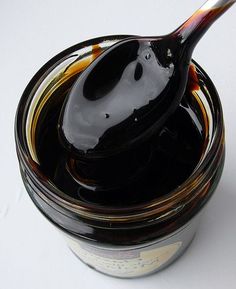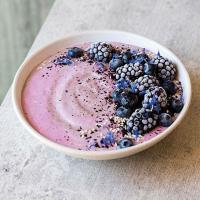
This humble sweetener is a time-tested, genuine super-food delivering impressive doses of:
Vitamin B6
Phosphorous
Chromium
Manganese
Magnesium
Potassium
Selenium
Calcium
Sodium
Copper
Cobalt
Iron
The nutrients found in this whole, natural food are much easier for your body to absorb than they would be if delivered through vitamin and mineral pills and other non-food forms of supplementation.
Clearly, there are lots of excellent reasons to add this tasty, nutritious food to your everyday diet. The health benefits of molasses are many and varied and include relieving problems such as:
Enlarged prostate
Skin ailments
Constipation
Headaches
Diabetes
Anemia
Obesity
Stress
Cancer
Acne
Additionally, molasses can help strengthen your immune system while assisting in the maintenance of healthy hemoglobin levels and supporting the formation of new body cells.
In this article, we will compare and contrast the various types of molasses, explain the benefits of this old-fashioned super-food and provide advice for adding it seamlessly to your daily health routine. Read on to learn more.
Why Do We Call It "Molasses"?
The Latin term for "honey" is "mel", which was used by the Portuguese to create their term "melaco" to describe this nutritious by-product of refined sugar production.
As the product migrated to the early colonies of North America, the pronunciation and spelling morphed into "molasses". The term "blackstrap" was added as a descriptive term for the darkest, thickest and strongest tasting variant of this product because the Dutch word for "syrup" is "stroop". Once in the Americas, "blackstroop" became "blackstrap" (but never "black strap molasses"!)
NOTE: Even though "molasses" ends with an "S", it is not a plural word. It is the name of the substance and is therefore singular. It is correct to say "molasses is". It is not correct to say "molasses are".
Where Does Molasses Come From?
Molasses originated in the Caribbean where sugar beets and sugarcane were grown. It is a byproduct of sugarcane and sugar beet processing. Today, that processing operation has spread to many areas of the world, including:
United States
Philippines
Thailand
Taiwan
Brazil
India
This means it is readily and affordably available for use as an all-around sweetener and health tonic.
Is All Molasses The Same?
Several factors come into play in determining the quality and nutritional benefits of any type of molasses. Among them are:
The type of refining process used.
The ripeness of the source plant.
The amount of sugar extracted.
The type of plant used.
Because molasses comes from a couple of different types of sugar producing plants, and because there are several manners of production, there are also several types of molasses. Some are preferable to others.
Molasses is basically what remains after extraction of pure sugar from sugar cane or sugar beets. To remove almost all of the sugar from these products, the extraction process consists of three boiling stages. Similar to nut and olive oil processing, which results in varying grades of oils, each stage of sugar beet or cane processing creates a different molasses grade.
Light Molasses:
The first boiling produces light molasses, which is the sweetest type and has the mildest flavor. Be careful not to confuse it with cane syrup, which is simply sugar cane juice boiled to make a syrup. It is not the same as molasses. It is more like maple syrup in weight and texture.
Dark Molasses:
Robust (dark) molasses is the result of the second boiling. This full flavored molasses contains less sugar content than light molasses, and it has a more complex and hearty flavor.
Blackstrap Molasses:
The third boiling results in very dark, antioxidant and nutrition-rich blackstrap variety. This thick, dark syrup has a robust taste. Most people find it too powerful to use straight, but it is excellent for adding nutrition to everyday recipes and use as a nutritional supplement.
Sorghum Molasses:
This sweetener comes from sorghum cane, which is grown primarily in the United States. It is not a by-product, but rather the sole product of sorghum cane processing. It is a natural sweetener that imparts benefits similar to those provided by light cane and beet molasses. [source]
Processing Methods Impact Nutritional Value
Hydrol:
Molasses obtained from starch hydrolysis is called a hydrol. Hydrolysis is chemical processing and should be avoided.
Sulphured Molasses:
Make sure when purchasing molasses you buy "unsulfured molasses." Sulfur is only added to molasses as a preservative if the plants processed are immature. When mature plants are used, a stabilizer is not needed. Sulfur imparts a bitter taste to molasses. [source]
Nutrition Value Of Molasses Varies
Of the three types of molasses available, blackstrap is the most abundant in minerals including trace minerals. Most notable of these are:
Manganese: This mineral is part of the enzyme known as superoxide dismutase, which is an antioxidant. It helps protect your cells from free radical damage. It also benefits the central nervous system by supporting the effective synthesis of fatty acids.
Copper helps facilitate proper absorption of iron. It is also essential in healthy tissue and bone development and the production of melanin, which gives your hair and skin color.
Iron is essential in the production of red blood cells and their protein, hemoglobin. Having plenty of red blood cells and good blood circulation is the basis of good health. A healthy circulatory system carries oxygen and nutrients throughout your body, removes waste products and keeps every aspect of your being healthy and strong.
Calcium builds strong bones and teeth, helps your muscles (including your heart) function properly, aids in proper blood clotting and assists your central nervous system in transmitting nerve impulses. Lack of calcium and improper calcium distribution can cause myriad health problems.
How Do You Choose The Right Molasses?
Even though blackstrap is most beneficial, you may wish to start out with a lighter type of molasses to accustom yourself to the flavor. Remember that Sorghum is not a true molasse because it is not a byproduct. It is, instead, the sole product of sorghum cane processing. Nonetheless, it is a reasonably nutritious natural sweetener that you may wish to add to your cupboard.
21 Ways Blackstrap Molasses Benefits Your Health: An Old-Fashioned Superfood
Folk wisdom has always informed us that blackstrap molasses provide healthy relief for a wide variety of problems such as ulcers, iron-deficiency anemia, and constipation. These days research and analysis back this traditional wisdom and amplify it.
In this article, we will explore the many benefits of blackstrap molasses as a good source of valuable vitamins and minerals.
blackstrap molasses benefits are numerous
Contents & Navigation [hide]
Why Do We Call It "Molasses"?
Where Does Molasses Come From?
Is All Molasses The Same?
Processing Methods Impact Nutritional Value
How Do You Choose The Right Molasses?
21 Ways Blackstrap Molasses Benefits Your Health
Smart Ideas For Using Molasses Every Day
Blackstrap Molasses Good For What Ails You!
Why Choose Blackstrap Molasses?
Where Can You Get Blackstrap Molasses?
Are There Any Downsides To Using Blackstrap Molasses?
Glycemic Index Comparison
How Much Is Too Much?
This humble sweetener is a time-tested, genuine super-food delivering impressive doses of:
Vitamin B6
Phosphorous
Chromium
Manganese
Magnesium
Potassium
Selenium
Calcium
Sodium
Copper
Cobalt
Iron
The nutrients found in this whole, natural food are much easier for your body to absorb than they would be if delivered through vitamin and mineral pills and other non-food forms of supplementation.
Clearly, there are lots of excellent reasons to add this tasty, nutritious food to your everyday diet. The health benefits of molasses are many and varied and include relieving problems such as:
Enlarged prostate
Skin ailments
Constipation
Headaches
Diabetes
Anemia
Obesity
Stress
Cancer
Acne
Additionally, molasses can help strengthen your immune system while assisting in the maintenance of healthy hemoglobin levels and supporting the formation of new body cells.
In this article, we will compare and contrast the various types of molasses, explain the benefits of this old-fashioned super-food and provide advice for adding it seamlessly to your daily health routine. Read on to learn more.
Why Do We Call It "Molasses"?
The Latin term for "honey" is "mel", which was used by the Portuguese to create their term "melaco" to describe this nutritious by-product of refined sugar production.
As the product migrated to the early colonies of North America, the pronunciation and spelling morphed into "molasses". The term "blackstrap" was added as a descriptive term for the darkest, thickest and strongest tasting variant of this product because the Dutch word for "syrup" is "stroop". Once in the Americas, "blackstroop" became "blackstrap" (but never "black strap molasses"!)
NOTE: Even though "molasses" ends with an "S", it is not a plural word. It is the name of the substance and is therefore singular. It is correct to say "molasses is". It is not correct to say "molasses are".
Where Does Molasses Come From?
Molasses originated in the Caribbean where sugar beets and sugarcane were grown. It is a byproduct of sugarcane and sugar beet processing. Today, that processing operation has spread to many areas of the world, including:
United States
Philippines
Thailand
Taiwan
Brazil
India
This means it is readily and affordably available for use as an all-around sweetener and health tonic.
Is All Molasses The Same?
Several factors come into play in determining the quality and nutritional benefits of any type of molasses. Among them are:
The type of refining process used.
The ripeness of the source plant.
The amount of sugar extracted.
The type of plant used.
Because molasses comes from a couple of different types of sugar producing plants, and because there are several manners of production, there are also several types of molasses. Some are preferable to others.
Shop Related Products
Golden Barrel Bulk Unsulfured Blackstrap...
$16.41
(321)
100% Natural, 100% Pure, Molasses, Blackstrap, U...
$13.39
(173)
Ads by Amazon
Molasses is basically what remains after extraction of pure sugar from sugar cane or sugar beets. To remove almost all of the sugar from these products, the extraction process consists of three boiling stages. Similar to nut and olive oil processing, which results in varying grades of oils, each stage of sugar beet or cane processing creates a different molasses grade.
Light Molasses:
The first boiling produces light molasses, which is the sweetest type and has the mildest flavor. Be careful not to confuse it with cane syrup, which is simply sugar cane juice boiled to make a syrup. It is not the same as molasses. It is more like maple syrup in weight and texture.
Dark Molasses:
Robust (dark) molasses is the result of the second boiling. This full flavored molasses contains less sugar content than light molasses, and it has a more complex and hearty flavor.
Blackstrap Molasses:
The third boiling results in very dark, antioxidant and nutrition-rich blackstrap variety. This thick, dark syrup has a robust taste. Most people find it too powerful to use straight, but it is excellent for
 Order Logbook
Order Logbook adding nutrition to everyday recipes and use as a nutritional supplement.
Sorghum Molasses:
This sweetener comes from sorghum cane, which is grown primarily in the United States. It is not a by-product, but rather the sole product of sorghum cane processing. It is a natural sweetener that imparts benefits similar to those provided by light cane and beet molasses. [source]
Processing Methods Impact Nutritional Value
Hydrol:
Molasses obtained from starch hydrolysis is called a hydrol. Hydrolysis is chemical processing and should be avoided.
Sulphured Molasses:
Make sure when purchasing molasses you buy "unsulfured molasses." Sulfur is only added to molasses as a preservative if the plants processed are immature. When mature plants are used, a stabilizer is not needed. Sulfur imparts a bitter taste to molasses. [source]
Nutrition Value Of Molasses Varies
Of the three types of molasses available, blackstrap is the most abundant in minerals including trace minerals. Most notable of these are:
Manganese: This mineral is part of the enzyme known as superoxide dismutase, which is an antioxidant. It helps protect your cells from free radical damage. It also benefits the central nervous system by supporting the effective synthesis of fatty acids.
Copper helps facilitate proper absorption of iron. It is also essential in healthy tissue and bone development and the production of melanin, which gives your hair and skin color.
Iron is essential in the production of red blood cells and their protein, hemoglobin. Having plenty of red blood cells and good blood circulation is the basis of good health. A healthy circulatory system carries oxygen and nutrients throughout your body, removes waste products and keeps every aspect of your being healthy and strong.
Calcium builds strong bones and teeth, helps your muscles (including your heart) function properly, aids in proper blood clotting and assists your central nervous system in transmitting nerve impulses. Lack of calcium and improper calcium distribution can cause myriad health problems.
How Do You Choose The Right Molasses?
Even though blackstrap is most beneficial, you may wish to start out with a lighter type of molasses to accustom yourself to the flavor. Remember that Sorghum is not a true molasse because it is not a byproduct. It is, instead, the sole product of sorghum cane processing. Nonetheless, it is a reasonably nutritious natural sweetener that you may wish to add to your cupboard.
True molasses comes from sugar cane and sugar beet production. Molasses derived from sugar cane is sweeter and more palatable. This is the type of molasses typically used for human consumption. Beet molasses is a bitter, yet a highly nutritious product. It is usually used to make fertilizer and as an additive to livestock feed.
Does Molasses Taste Good?
Molasses has a strong, rich taste that is not nearly as sweet as refined table sugar. When you first begin to use molasses as a sweetener, you may wish to start off with the light variety. As you become accustomed to the flavor, perhaps you will want to try the stronger varieties (which deliver more nutrients and greater health benefits).
You may also wish to use the different varieties for different purposes. For example, you might use sorghum as pancake syrup, light molasses to sweeten beverages, dark for baking and cooking and blackstrap specifically as a nutritious additive to smoothies and other recipes specifically targeting health benefits.
21 Ways Blackstrap Molasses Benefits Your Health
It seems very strange that this healthful, nutritious food comes from the leftovers after extracting the target product. It is clearly the better of the components since refined sugar contains nothing but simple carbohydrates, which wreak havoc on your health. [source]
The process of refining sugar removes all the minerals, and they end up in the byproduct, molasses. This delicious natural syrup is rich in B vitamins and contains small amounts of fiber and fat, along with a host of valuable minerals:
All of these nourishing components combine to provide wonderful health benefits, such as:
#1 - Protect Against Oxidation And Degenerative Diseases
This dark, rich syrup is just chock full of antioxidants that provide significant protection against the ravages caused by inflammation, oxidation, and degeneration. Choosing molasses over other types of sweeteners can provide significant heart health benefits and stave off dementia, cancer and a wide variety of other painful and serious conditions.
#2 - Ease Menstrual Discomfort And Complications
The normal blood loss experienced during menstruation can cause low iron levels, this is, even more, the case when menstrual disorders (e.g. menorrhagia) cause excessive blood loss.
It can be difficult to get enough iron to counteract this problem. The iron found in supplements can be potentially hazardous for the liver. Iron found in natural sources, such as red meat, comes packaged in lots of calories and fat.
Molasses delivers a powerful dose of natural iron without an excessive number of calories and with practically no fat. Additionally, the other minerals found in molasses can help tone uterine muscles, prevent blood clots and relieve cramping.
#3 - Lose Weight And Stay Healthy
One of the antioxidants found in molasses (polyphenol) can help you lose weight and keep it off. It does this by tempering the body's calorie absorption.
#4 - Enjoy A Happier, Healthier Sex Life
The minerals in molasses also help boost hormone production, increase fertility, enhance central nervous system functioning and process carbohydrates and protein efficiently to give you plenty of consistent strength and energy.
#5 - Work Out More Effectively
Steady, consistent energy levels and freedom from fatigue can help you get more out of your workout. The essential minerals found in molasses helps build and maintain the muscles and bones. Getting plenty of calcium also helps build muscle strength and assists with powerful muscle contraction. Magnesium keeps muscles relaxed and prevents fatigue and muscle cramps.
#6 - Keep Your Bones Healthy And Strong
The powerful combination of calcium and manganese found in molasses builds strong bones and teeth. This helps protect against bone loss that comes with aging.
#7 - Avoid Arthritis Pain
Adding blackstrap molasses to your daily diet contributes to bone health and strength overall. It also helps ease joint pain by reducing inflammation and nourishing your bones and the connective tissues that hold them together.
#8 - Guard Against Rheumatism And Neuralgia
Many anti-inflammatory and antioxidant medications contain molasses because it imbues these properties naturally. Regularly consuming this healthy, natural sweetener can help reduce inflammation around the joints (and throughout the body) and soothe the nerves to reduce pain caused by rheumatism, neuralgia, and other inflammatory conditions.
#9 - Stay Regular
Enjoy a cup of warm milk with molasses at bedtime every night to resolve and prevent constipation. This combination is so effective it is used in pediatric emergency rooms as an enema for children who are in dire need of relief of constipation. [source]
#10 - Get Your Blood Sugar Levels Under Control
Dark molasses has a relatively low glycemic index, and it contains significant amounts of chromium. This trace element is instrumental in slowing down carbohydrate and glucose metabolism. This results in lowered production of insulin.
#11 - Reduce Lipid And Fat Accumulation In Your Bloodstream
People who do not have adequate chromium intake are at greater risk for developing diabetes, heart trouble, high cholesterol levels, atherosclerosis and other inflammation induced chronic diseases.
#12 - Stabilize Your Blood Pressure And Your Heart
A lack of proper minerals can cause both high blood pressure (hypertension) and low blood pressure (hyperkalemia). Neither is desirable and both can contribute to heart trouble. The potassium found in molasses can help stabilize your blood pressure.
#13 - Avoid Heat Stroke
Proper potassium intake also helps maintain your body's acid base, which in turn prevents you from succumbing to heat exhaustion in the summertime.
#14 - Combat Acne From Within
Adding molasses and other food sources of lactic acid to your diet can help resolve acne. You will find lactic acid in molasses, tomato juice, apples, sour milk, homemade yogurt and some other foods helps with carbohydrate metabolism. Efficient metabolism supports healthy skin.
#15 - Heal Minor Injuries And Burns
Molasses applied topically helps promote healthy tissue growth. It makes an excellent "salve" for minor burns and injuries. Simply clean the injured area thoroughly, apply a light coat of blackstrap molasses and cover with a clean, dry bandage.
#16 - Build And Maintain Healthy Red Blood Cells And Hemoglobin
The iron and copper found in molasses support your body in producing more red blood cells and oxygen-carrying hemoglobin. Having a high red blood cell count and a well-oxygenated body is essential for vitality, healthy metabolism, a strong heart, healthy thyroid gland, strong immune system and more.
#17 - Build New Cells
The B vitamins found in this robust, dark syrup (especially folate) are instrumental in helping your body regenerate and build new cells. This is one of the many reasons why it is such a good healer. It is also an excellent tonic during pregnancy. Regular use of molasses as a natural sweetener helps the growing baby build strong bones, muscles, and central nervous system.
#18 - Soothe And Strengthen Your Nerves
The magnesium found in molasses relaxes nerves and blood vessels. This helps with good blood circulation and facilitates even distribution of calcium to the central nervous system. Excessive distribution of calcium can cause over stimulation of the nerves. Maintaining healthy blood circulation is a good way to preserve emotional equilibrium and avoid anxiety and hypertension.
#19 - Treat ADHD And ADD Naturally
People suffering from these conditions are often found to have mineral deficiencies. Adding natural B vitamins, iron, calcium, magnesium and zinc to the diet can have a calming and leveling effect. These nutrients are known to benefit the central nervous system, enhance brain function, provide mood stability and improve the ability to focus.
#20 - Prevent Stress, Fatigue, Asthma Attacks And Headaches
The rich combination of vitamins and minerals found in molasses contributes to overall glowing good health. In particular, the antithetic acid and vitamin B6 help energize the body, soothe the nerves and reduce incidence of chronic headaches and the severity and frequency of asthma attacks.
#21 - Avoid Cancer
The antioxidant and anti-inflammatory properties of this humble super-food help your body fight off the development of cancer. Selenium, in particular, is very effective in preventing the growth of cancer cells and is actually used in a number of cancer treatments.
Watch Video



